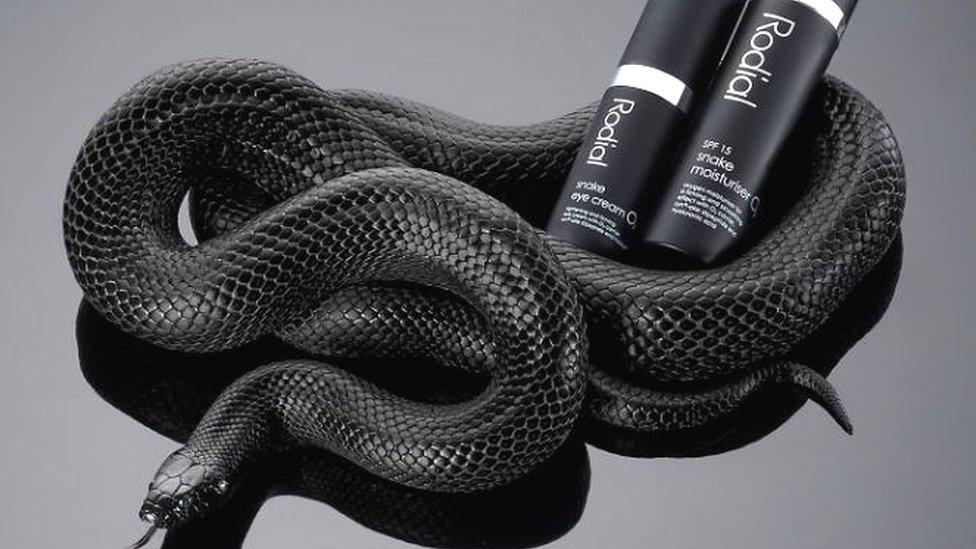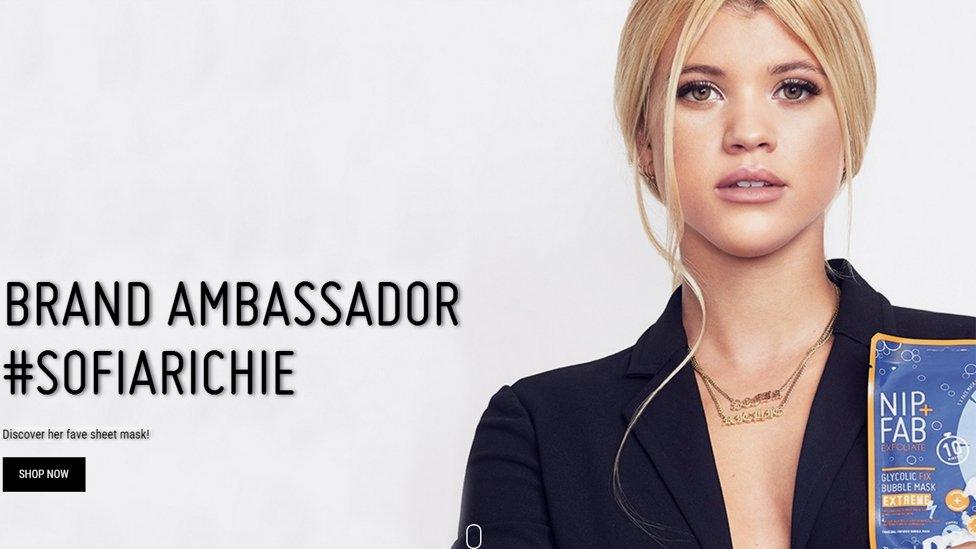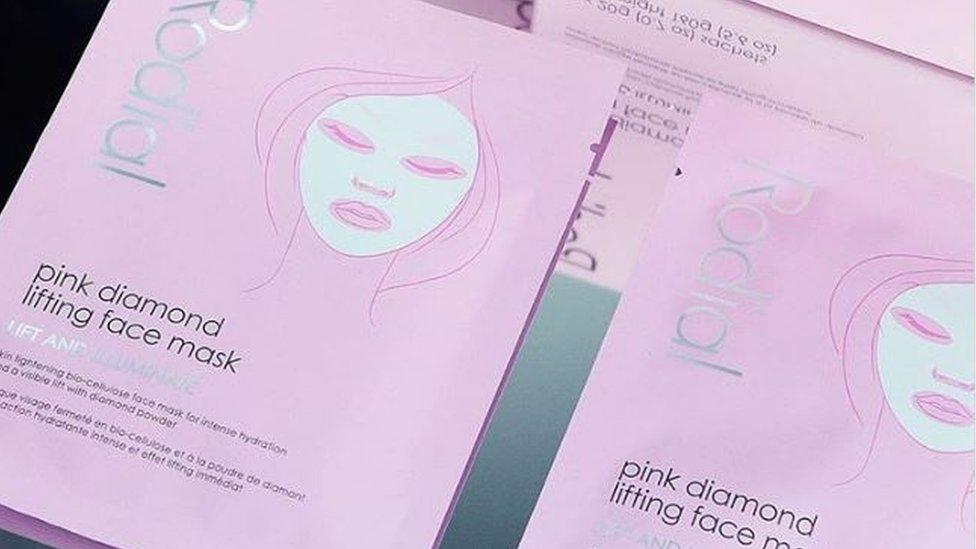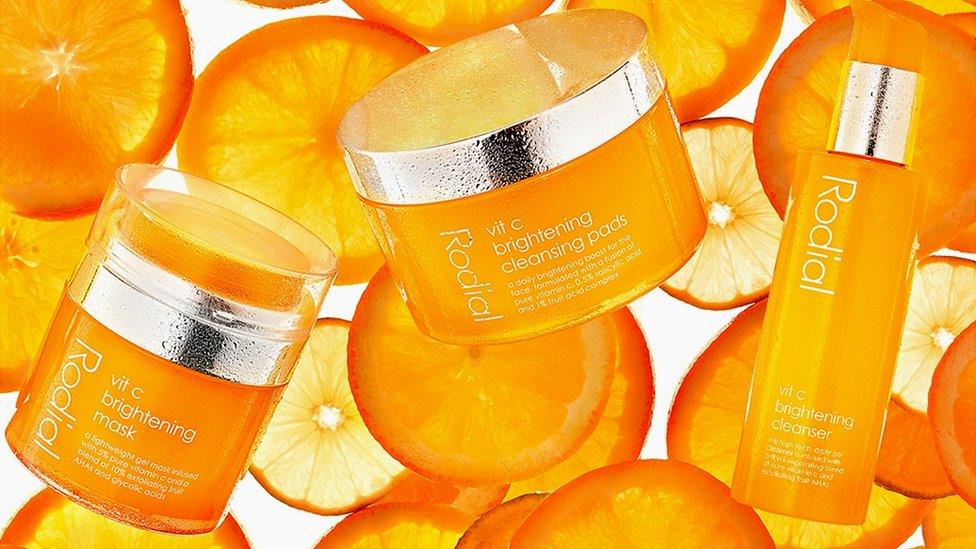The beauty boss who turned snakes into ladders
- Published

Maria Hatzistefanis: "I start each day with a mission and a plan. I can't pretend it's effortless."
Snake Serum and Dragon's Blood - not names you'd first associate with a high-end skincare range.
So, when Maria Hatzistefanis decided after several years in business to give her beauty products more eye-catching names she knew it might be risky.
It worked, though. Not only did the names create a talking point, they led to the products flying off the shelves.
For years, the chief executive and founder of beauty brands Rodial and Nip + Fab had erred on the side of safety. "That didn't help us a lot," she now admits.
"I was going to launch the serum with the name 'anti-wrinkle serum' but that wasn't exciting," she says.
Ms Hatzistefanis, 47, says a key ingredient used in her products, syn-ake peptide, replicates the reaction to a snake bite, resulting in a mild freeze-like effect in facial muscles.
"One day, I brainstormed with my team and, as one of the ingredients mimicked the effect of snake venom I said, 'let's go crazy and see what happens'.
"We had no idea how things would go. We were a small business with nothing to lose," she says.
The more exciting branding worked. "It got a lot of people interested, including celebrities who were looking for the latest anti-ageing product.
"We were selling out within a few weeks. We had to call the warehouse and get them to fill thousands of bottles. It was a crazy time," says the entrepreneur, who lives in London with her husband and two teenage boys.

Rodial's move to more distinctive advertising gave a big boost to sales
Growing up in her native Greece, Ms Hatzistefanis always had a taste for beauty. As a teenager, she'd treat friends to make-overs and would tear out skincare tips from magazines.
While studying at university she found a dream job as a part-time beauty writer for Seventeen magazine.
But after graduating, she wanted to live in New York, and studied an MBA at Columbia Business School.
That took her down a very different path. She worked for investment bank Salomon Brothers, attracted at first by the high salary and business travel.
But after two years of this non-stop life - first on Wall Street and then in London - she says she mentally started to "check out".
Unsurprisingly, this didn't go down too well with her bosses - and they made her redundant in 1999.
She didn't want to work for another bank, and so decided to return to her passion for the beauty sector.
Ms Hatzistefanis recalls that back then, and especially when she was a beauty writer, there were few skincare products targeting specific skin concerns - pigmentation, fine lines, age spots.
"It was basically about cleansers, toners and moisturisers. I always thought there should be specific products," she says.

Model Sofia Richie is a "brand ambassador" for Nip + Fab
So, armed with £20,000 of savings and a husband who supported her while she wasn't taking a salary, she started Rodial in London in 1999.
The idea was to produce products aimed at treating specific skin concerns. The company started with four products, including a body lotion targeting cellulite.
Like many small business owners eager to be stocked on the shelves of department stores, Ms Hatzistefanis says those early years were challenging.
"I'd have a good day, thinking 'yes, my product should be in that store' and then send them an email." If a rejection came, "I'd get disheartened and I'd leave it for a bit".
"But then if something great happened with the business [such as a good piece of press] I'd think, 'Ok this is the right time' to try again."
In 2001, Fenwick of Bond Street became her first department store stockist.
The business grew, and in 2010 Ms Hatzistefanis launched a second brand, Nip + Fab, targeting a younger, more money-conscious consumer.

Reality TV celebrity Kylie Jenner was signed up as a brand ambassador in 2015 after the Kardashian sister flagged up one of the Nip + Fab products on Instagram. Sales spiked.
Last November, 19-year-old model Sofia Ritchie became the latest brand ambassador.
Together, the Rodial and Nip + Fab brands have 10,000 stockists worldwide including Boots, Superdrug and Harrods, and websites that sell direct to consumers. Annual sales across the two brands are thought to be near the £20m mark.
The performance of Rodial and Nip + Fab comes as the beauty industry is booming, with the global skincare market worth $116bn (£83bn) in 2016, up from $110bn in 2015, according to Euromonitor.
Irina Barbalova, a beauty analyst at Euromonitor International, says the brands are performing strongly in a competitive market.
"Both brands benefit from a very targeted portfolio of products, centred around specific skin concerns and face and body areas," she says.
"Customers are looking for high quality, and Rodial projects these credentials through a strong luxury image and price point, and science-backing to target the high-end spenders. Nip + Fab connects with the younger cohort through playful language and packaging."

However, Ms Barbalova says sustaining current growth levels amid competition from new start-ups and direct-to-consumer brands will be a challenge.
Ms Hatzistefanis says she has no plans to sell the brands, which employ 150 people, and are based in Chelsea, London.
"I enjoy what I do and I like to be in control of things. The business is profitable.... But never say never," she says.

More The Boss features, which every week profile a different business leader from around the world:

As well as being business-savvy, she is obviously driven. A typical day can include working on new product launches, mentoring, speaking engagements, press interviews and celebrity parties.
She responds to most social media posts on her own "Mrs Rodial" Instagram page, which has one million followers, and she recently launched a business help book, "How to be an Overnight Success".
How does she fit it all in?
"I start each day with a mission and a plan," she says. "I can't pretend it's effortless. It takes a lot of work.
"Rodial and Nip + Fab are my day-to-day work, but I do enjoy being out there, and speaking and mentoring makes me feel good in being able to give something back."